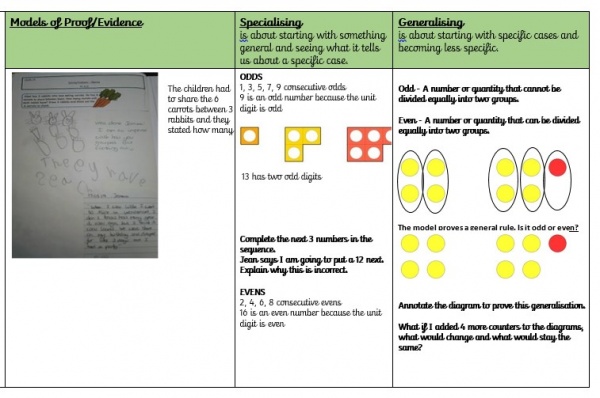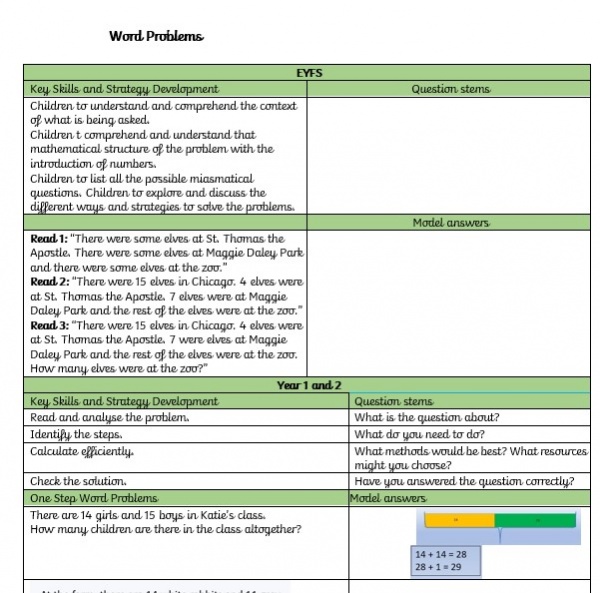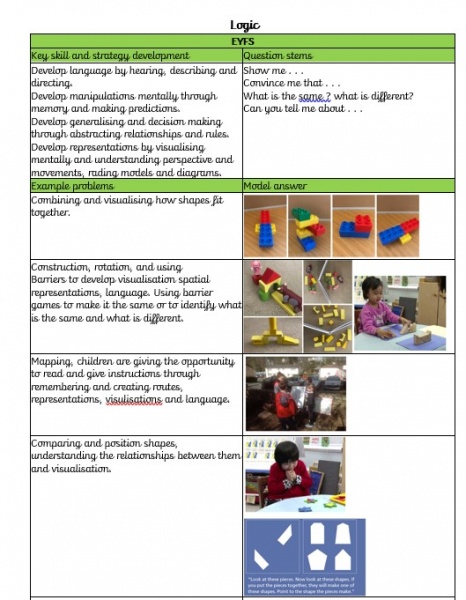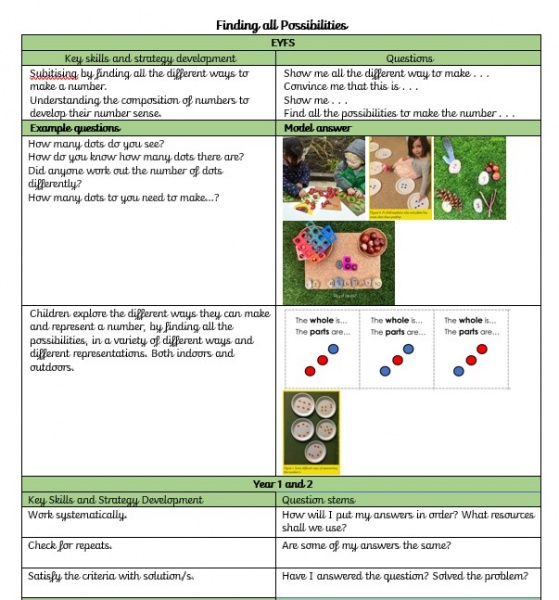Mathematics

Woodlands’ Numeracy curriculum offer is based on the new National Curriculum (2014) and the New Early Years Foundation Stage Statutory framework (2021). Mathematics is a creative and highly inter-connected discipline that has been developed over centuries, providing the solution to some of history’s most intriguing problems. It is essential to everyday life, critical to science, technology and engineering, and necessary in most forms of employment. A high-quality mathematics education therefore provides a foundation for understanding the world, the ability to reason mathematically, and a sense of enjoyment and curiosity about the subject.
At Woodlands, we teach our children to be confident and capable mathematicians using a range of teaching strategies, resources, exciting and motivating lessons all designed to address the three aims of the curriculum: Fluency, Reasoning and Problem Solving. We strive to achieve this with a set of non-negotiables for each year group (see bottom of the page) which outline the essential elements of declarative knowledge (facts), procedural knowledge (methods), conditional knowledge (strategies) that pupils need as they progress from EYFS to year 6.
/Curriculum/Mathematics/MicrosoftTeams-video.mp4
Intent
By the time pupils leave school, we intend for them to have achieved the end of key stage objectives for Numeracy, knowing and remembering more mathematical facts, vocabulary and strategies. However, we also aspire to generate enthusiasm and fascination, for not just mathematics but also for the world, through positive and exciting learning experiences. We want to provide children with transferable skills (including resilience and curiosity) that they can implement in their future, both in education and life itself. By the time children leave Woodlands we aim for them to:
- Become fluent by knowing and remembering declarative knowledge (number facts) and have a fluency in using them. To have a rapid recall of number facts as this is the basic knowledge for all aspects of mathematics, including through varied and frequent practice.
- Have clear procedural knowledge so that children understand the relationships between facts and procedures, so that pupils have conceptual understanding and can recall and apply their declarative knowledge rapidly and accurately through both informal and formal methods.
- Have clear conditional knowledge so that children understand the relationship between facts, strategies and missing information. Allowing children to use and apply both their number facts and number methods in order to problem solve and reason mathematically.
Alongside our aims, we also believe that by the time our children leave Woodlands they should also have:
- The confidence in mathematics so they are able to express themselves and their ideas using the language of mathematics to justify and prove.
- An understanding of how mathematics is used beyond the classroom in everyday life and the world of work.
- A passion for mathematical learning
- An awareness and understanding of relationships within mathematics by following a line of enquiry through the ability to generalise.
- An awareness of the range of strategies by applying their mathematic skills in a variety of problems with increasing sophistication, including breaking down problems into a series of simpler steps and persevering in seeking solutions.
- The ability to preserve and be resilient in their everyday learning.
Implementation
In the Early Years, we believe that developing children’s understanding of numbers to 10 is critical. In September 2021, the new statutory Early Years Framework was introduced, outlining the new Early Years Goals (ELG). Alongside our knowledge of our children and their families, teachers use Birth to Five Matters and Development Matters objectives when planning, in order to achieve the ELG’s by the end of Reception. To support this, we use the NCTEM Mastering Number resources and scheme of learning. This allows children to focus on developing a strong "number sense" through playful, practical, and hands-on activities. This foundation goes beyond rote counting and includes understanding the meaning of numbers, their relationships, and how to apply them in real-world contexts.
In Nursery, children access maths throughout the day in addition to adult led, small group maths sessions, to enable the children to being learning how to subitise numbers to five. In Reception, this is built upon and the children that achieve the ELGs at the end of Reception are confident using and applying numbers to ten.
In Key Stages 1 and 2, we follow White Rose Maths scheme of learning and it’s small steps approach. This allows all children to 'keep up' and not 'catch up'. Through this we incorporate the teaching through mastery approach utilising their 5 big ideas (coherence, representation and structure, mathematical thinking, fluency and variation). Utilising White Rose maths resources allows children to develop their oracy skills through using correct and contextually mathematical language and develop mathematical learning behaviours so pupils focus and engage fully as learners who reason and seek to make connections. Children are given the opportunity to further develop their procedural and conditional knowledge through problems and reasoning questions (known as ’Stylish Solutions’). This type of questioning allows variation for mastery and depth within the standard being taught, allowing children to build relationships between knowledge through the application of logical thinking, generalisations and systematic working.
To further support this, children in year 1 and 2 follow the Mastery For Number daily before their main maths lesson. This ensures children have secure firm foundations in the development of good number sense for all children, allowing them to develop fluency in calculation and a confidence and flexibility with number.
Children in Key Sage 2, conduct 'Fluent in 5' at the start of each maths lesson. through use of White Rose Flashbacks, allowing them to rehearse four operations, to embed declarative knowledge and increase the speed of recall and fluency of written and mental methods, and retrieve previously taught knowledge and skills.
Fortnightly daily guided maths sessions are also used to improve children's recall of key number facts, each half term they focus on specific declarative information to improve instantly recall, for example, times table facts, number bonds etc.
Our calculation policy outlines the key declarative knowledge for each year group, in addition to the core models and images and layout of calculations. For example:
Staff are also supported with progression documents for the 5 areas of problem solving (Logic, Word Problems, Patterns, Reasoning and all possibilities- examples below)
We have embedded a set of non-negotiables to outline for teachers, children and parents the mathematical knowledge and skills that children are taught each year. For example:

key instant recall facts overview.pdf
Before each lesson, the children complete a ‘cold task’ to accurately and quickly assess prior knowledge and skills. This determines the level of support or challenge needed for each specific lesson. We know that simply ‘grouping’ children in to ‘maths seats’ does not account for the wide range of skills that children may already have, in each discipline of the subject. Throughout every maths lesson, children are given the opportunity to further develop their procedural and conditional knowledge through problems and reasoning questions (known as ’Stylish Solutions’). This type of questioning allows variation for mastery and depth within the standard being taught, allowing children to build relationships between knowledge through the application of logical thinking, generalisations and systematic working.
Those pupils who require additional support are provided with opportunities to catch up through a variety of tailored interventions including: ‘Numicon’, maths tutoring and daily ‘Number Stacks’. Number stacks improves and develops fluency and understanding by using practical resources, videos and models that are personalised to children with specific, identified gaps in knowledge.
information for parents multiplication tables check.pdf
Our calculation policy outlines the key declarative knowledge for each year group, in addition to the core models and images and layout of calculations. For example:
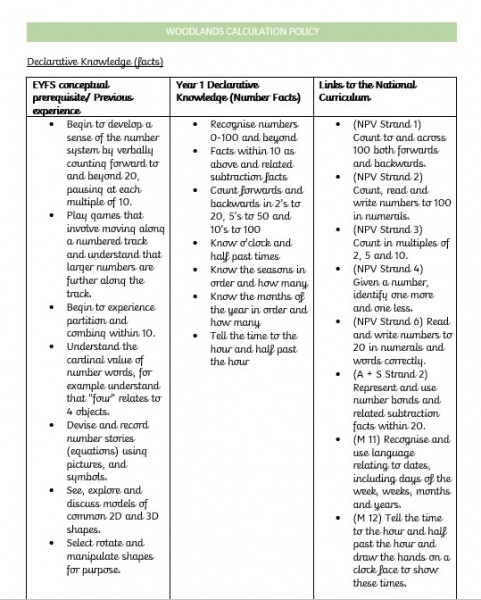
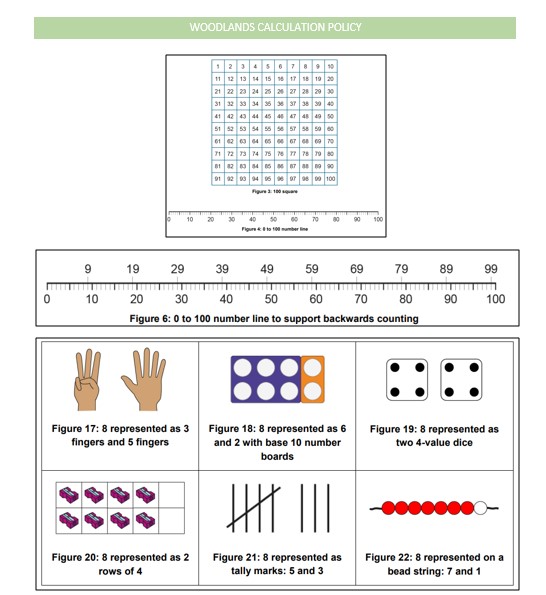
Our curriculum is carefully designed to ensure key knowledge and skills progress in a logical and sequenced way, thus enabling pupils to revisit previously taught content and to build upon it year on year. We use carefully structured progression documents to ensure that substantive and disciplinary knowledge and skills are clearly outlined and sequenced, thus enabling the children to know and remember more, as they move through school.
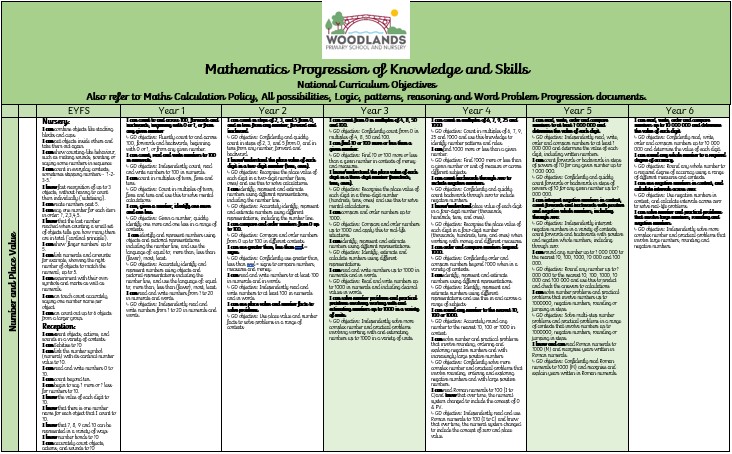
Staff are also supported with progression documents for the 5 areas of problem solving (Logic, Word Problems, Patterns, Reasoning and all possibilities- examples below)

